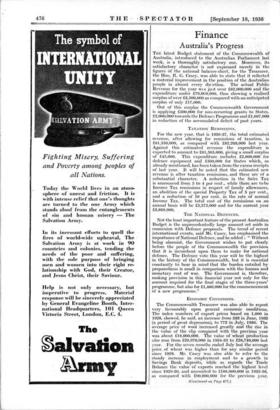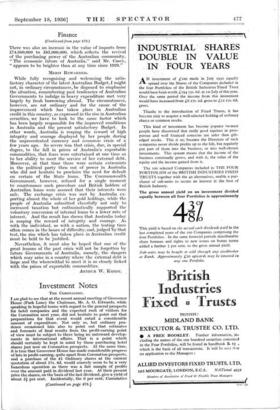Finance
Australia's Progress
TfIE latest Budget statement of the CommonWealth Of AuStialia, introduced to the Austialian Pailiarnent last week, is a thoroughly satisfactory , one. Moreover, its satisfabtory character is 'not expressed merely in the figures of the national balance-Sheet, for the Treasurer, the Hon. R. G. Casey, was able to state that it reflected a material improvement in the position of the AuStialian people in almost every diraction. The actual. Public Revenue for the year wcs just over £82,000,000 and the expenditure under 179,000,000, thus showing a realised surplus of over 13,500,000 as compared with an anticipated surplus of only £17,000. • - Out of this surphis the Commonwealth Government is applying £500,000 for non-recurring grants to States, /2,000,000 towards the Defence Programme and £1,067,000. in reduction of the accumulated deficit of past years.
TAXATION REMISSIONS.
For the new year, that is 1936-37, the total estimated revenue, after, allowing for remissions of taxation, is £81,550,000, as compared with £82,203,000 last year. Against this estimated revenue the expenditure is expected to amount to £81,505,000, giving a small surplus of £45,000. This expenditure ,includes £2,000,000.; for defence equipment and £500,000 for States which, as already mentioned, has been taken from the excess receipts of last year. It will be noted that the estimated new revenue is after taxation remissions, and these are of a substantial character. A reduction in the Sales Tax is announced from 5 to 4 per cent., while there are to be Income Tax remissions in respect of family allowances, an abolition of the special Property Tax of 5 per cent., and a reduction of 10 per cent. in the rate of normal Income Tax. The total cost of the remissions, on a4 annual basis will be £5,275,000 and for the current year £3,868,000.
THE NATIONAL DEFENCES.
Not the least important feature of the present Australian • Budget is the unprecedentedly large amount set aside in connexion with Defence proposals. The trend of recent international events, said Mr. Casey, has emphasised the importance of National Defence, and he added : " Without being alarmist, the Government wishes to put clearly before the people of the Commonwealth the provision that it is incumbent upon them to make for national defence. The Defence vote this year will be the highest in the history of the Commonwealth, but it is essential constantly to bear in mind that the burden entailed by preparedness is small in comparison with the human and monetary cost of war. The Government is, therefore, making provision in this financial year not only for the amount required for the final stages of the three-years' programme, but also for £1,480,000 for the commencement of a new programme."
ECONOMIC CONDITIONS.
The Commonwealth Treasurer was also able to report very favourably upon general economic conditions. The index numbers of export prices based on 1,000 in 1928, showed, he said, an increase from 533 in June, 1982 (a period of great depression), to 772 in July, 1936: The average price of wool increased greatly and the rise in the value of the clip compared with the previous year was about £18,000,000. The value of wheat production also rose from 120,970;000 in 1934-35 to £26,740,000 Iasi year. For the seven months ended July last the average price_ of wheat was higher than for any similar period since 1928. Mr. Casey was also able to refer to the steady increase in •employment and to a growth in' Savings Bank deposits, while as regards the Trade Balance the value of exports reached the highest level since 1929-30, and amounted to £108,000,000 in 1935-36, as compared with £90,000,000 for the previous year.
(Continued on Page 477.) Finance
(Continued from page 476.) There was also an increase in the value of imports from £74,000,000 to £85;000,000, which reflects the revival of the purchasing pOwer of the Australian community. " The economic future of Australia," said Mr. Casey, " appears to be brighter than at any time since 1929."
MERIT REWARDED.
While fully recognising and welcoming the satis- factory character of the latest Australian Budget, I might not, in ordinary circumstances, be disposed to emphasise the situation, remembering past tendencies of Australian Governments to indulge in heavy expenditure met very largely by fresh borrowing abroad. The circumstances, however, are not ordinary and for the cause of the improvement which has taken place in Australian credit in this country, as expressed in the rise in Australian securities, we have to look to the same factor which has been largely responsible for the improved conditions in Australia and the present satisfactory Budget. In other words, Australia is reaping the reward of high integrity and courage displayed by her people during the unprecedented currency and economic crisis of a few years ago. So severe was that crisis, due, in special degree, to the fall in prices of Australia's exportable commodities, that fears were entertained at one time as to her ability to meet the service of her external debt. Moreover, at that time there were certain extremists in the political party then out of power in Australia who did not hesitate to proclaim the need for default on certain of the State loans. The Commonwealth Government, however, refused for a single moment to • countenance such procedure and British holders of Australian loans were assured that their interests were safe. The exchange crisis was 'met by Australia ex- porting almost the whole of her gold holdings, while the people of Australia submitted cheerfully not only to increased taxation' but enthusiastically supported the voluntary conversion of internal loans to a lower rate of interest. And the result has shown that Australia today is• reaping the reward • of integrity and courage. As with the individual, so with a- nation, the testing time often comes in the hours of difficulty, and, judged by that test, the rise which has taken place in Australian credit must- be held to be justified.
-Nevertheless, it must also be hoped that one of the great lessons of the past crisis will not be forgotten by future -Governments of Australia, namely, the dangers which may arise in a country where the external debt is large and the wherewithal to meet it is so closely linked with the prices of exportable commodities.











































 Previous page
Previous page